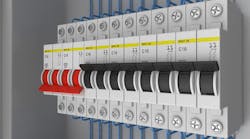Generally, you must install a fuse or circuit breaker at the point where the conductors receive their supply [240.21]. But under seven different conditions described in the nearly three pages of 240.21(A) through (H), you don’t have to.
With so much text and so many exceptions, things can get confusing in a hurry. Let’s examine the first exception:
Branch-circuit conductors that meet the requirements of 210.19 can have overcurrent protection per 210.20 [240.21(A)].
What’s in 210.19?
• Circuits not more than 600V must meet one of four conditions in 210.19(A).
• Circuits more than 600V must meet one of two conditions in 210.19(B).
210.20 requires the OCPD rating or setting to comply with:
• Cannot be less than the noncontinuous load plus 125% of the continuous load (an Exception exists).
• Conductors must be protected per 240.4; protect flexible cords and fixture wires per 240.5.
• Rating or setting of OCPD can’t exceed what’s specified in the applicable articles referenced in Table 240.3.
• Outlet device rating or setting cannot exceed what’s specified in 210.21.



